When the memories of two or three persons now upon earth shall be rolled up and sealed with their records within them, there will be no remembrance left open, except this, of a man whose silence seems better worth interpreting than the speech of many another. Of himself he has left no vestiges. It was a common reproach against him that he never acknowledged the obligation to any kind of restlessness. The kingdom of heaven suffereth violence, but as he did none there was nothing for it but that the kingdom of heaven should yield to his leisure. The delicate, the abstinent, the reticent graces were his in the heroic degree. Where shall I find a pen fastidious enough to define and limit and enforce so many significant negatives? Words seem to offend by too much assertion, and to check the suggestions of his reserve. That reserve was life-long. Loving literature, he never lifted a pen except to write a letter. He was not inarticulate, he was only silent. He had an exquisite style from which to refrain. The things he abstained from were all exquisite. They were brought from far to undergo his judgment, if haply he might have selected them. Things ignoble never approached near enough for his refusal; they had not with him so much as that negative connexion. If I had to equip an author I should ask no better than to arm him and invest him with precisely the riches that were renounced by the man whose intellect, by integrity, had become a presence-chamber.
It was by holding session among so many implicit safeguards that he taught, rather than by precepts. Few were these in his speech, but his personality made laws for me. It was a subtle education, for it persuaded insensibly to a conception of my own. How, if he would not define, could I know what things were and what were not worthy of his gentle and implacable judgment? I must needs judge them for myself, yet he constrained me in the judging. Within that constraint and under that stimulus, which seemed to touch the ultimate springs of thoughts before they sprang, I began to discern all things in literature and in life—in the chastity of letters and in the honour of life—that I was bound to love. Not the things of one character only, but excellent things of every character. There was no tyranny in such a method. His idleness justified itself by the liberality it permitted to his taste. Never having made his love of letters further a secondary purpose, never having bound the literary genius—that delicate Ariel—to any kind of servitude, never having so much as permitted himself a prejudice whereby some of his delights should be stinted while others were indulged beyond the sanctions of modest reason, he barely tolerated his own preferences, which lay somewhat on the hither side of full effectiveness of style. These the range of his reading confessed by certain exclusions. Nevertheless it was not of deficiencies that he was patient: he did but respect the power of pause, and he disliked violence chiefly because violence is apt to confess its own limits. Perhaps, indeed, his own fine negatives made him only the more sensible of any lack of those literary qualities that are bound in their full complement to hold themselves at the disposal of the consummate author—to stand and wait, if they may do no more.




